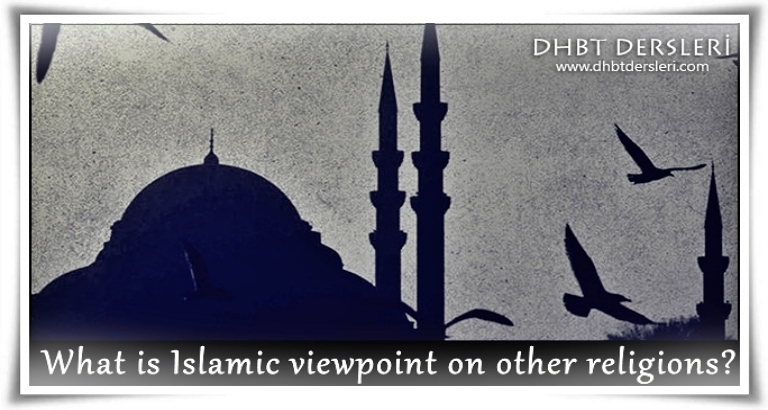First, it is necessary to understand the Islamic viewpoint on diversity in order to understand its position regarding other religions. Many passages in the Qur’an underscore the diversity of humankind. Islam qualifies religious diversity as part of Allah’s will (Rum 30:22).
What is Islamic viewpoint on other religions?
The Qur’an teaches that Allah purposefully created a world of diversity and made each of us belong to one human family, without any inherent superiority of one over another. Another example is Surah 35 (The Originator), which discusses the existence of magnificent harmony of the created beings despite their diversity.
According to this surah, diversity is richness. According to the whole of the Qur’an, targeting any race, color or language of human race means targeting the will of Allah.
In the Qur’an, as much importance is given to the diversity and plurality as to the oneness/unity of the Creator.
Thus the Qur’an gives these two messages when those are put in context:
1. Any contrariness/contraposition to the principle of Allah’s transcendental oneness and uniqueness produces shirk; and
2. Any contrariness/contraposition to the principle of diversity and plurality of the created beings produces “dhulm.” (Dhulm is used interchangeably for cruelty or unjust acts of exploitation, oppression, and wrongdoing, whereby a person either deprives others of their rights or does not fulfill his obligations towards them.)
Islam sees the diversity of religions on Earth as part of Allah’s will. Allah does not expect Muslims to force everyone in the world to become believers. This is stated in the Qur’an clearly: “And if thy Lord willed, all who are in the earth would have believed together.
Wouldst thou (Muhammad) compel men until they are believers?” (Yunus 10:99)
Thus, according to the Qur’an, dreaming of a world without diverse religions would be tantamount to opposing Allah’s will.Allah protects different religions’ places of worship through defending some people by means of others. The Qur’an says: “For had it not been for Allah’s repelling some men by means of others, cloisters and churches and oratories and mosques, wherein the name of Allah is oft mentioned, would assuredly have been pulled down” (Haj 22:40)
What is the Islamic viewpoint on living together with representatives of other religions?
Let us find answers from the history and geography of Islam:
1. History did not witness discrimination or any other degrading behavior toward religious minorities in those locations, which Muslim armies conquered.
This benevolent behavior includes those offshoots from Islam, which put up a severe opposition to rulers, including Yazidis in modern day Turkey, Druses in Lebanon, Sikhs in India and Baha’is in Iran, to name only a few. On the contrary, numbers of Muslims were brought down to zero in Spain following their 800-year-long existence there; Sicily followed suit later.
Furthermore, no single Muslim was to be found in just two days after the Crusaders set foot in Jerusalem on July 15, 1092. To be sure, there were scores of Christians and Jews living in Jerusalem at the time under the Muslim rule.
2. There is no single fact either in history or in modern times whereby non-Muslims would be denied access to their temples in Muslims-ruled lands and countries.
There were eight fortress cities built in the history of Islam, including Basra, Kufah, Cairo and Kairouan. Muslims erected these cities on plain fields where no foundation was laid before.
It is a historical fact that religious minorities lived in these cities and were able to practice their religions in respective temples. The following words of Amin Maalouf, a Christian litterateur from Lebanon, confirm this claim: “If my forefathers were Muslims in a country conquered by non- Muslim armies, and not Christians in a Muslim army-conquered country, I do not believe they would enjoy peaceful life in their towns and villages for 14 centuries with their faith protected by the rulers.”
3. The Qur’an guarantees non-Muslims’ ability to exercise their rights even in Muslims-ruled countries (Ma’idah 5:43, 47).
The Qur’an talks about Jews, Christians and Muslims:
“Unto every one of you have We appointed a [different] law and way of life. And if Allah had so willed, He could surely have made you all one single community: but [He willed it otherwise] in order to test you by means of what He has vouchsafed unto you. Vie, then, with one another in doing good works! Unto Allah you all must return; and then He will make you truly understand all that on which you were wont to differ” (Ma’idah 5:48)
This verse, therefore, not only approves of and encourages representatives of different religions to live in the same environment, but it also guarantees respect for their rights and liberties.

































